Alfa Romeo Junior vs SsangYong Korando – Which car suits you better?
Two cars, one duel: Alfa Romeo Junior meets SsangYong Korando.
Which one wins in performance, efficiency and value for money? Find out now!
Costs and Efficiency:
Price and efficiency are often the first things buyers look at. Here it becomes clear which model has the long-term edge – whether at the pump, the plug, or in purchase price.
Alfa Romeo Junior has a minimal advantage in terms of price – it starts at 25700 £, while the SsangYong Korando costs 27000 £. That’s a price difference of around 1320 £.
Fuel consumption also shows a difference: Alfa Romeo Junior manages with 4.80 L and is therefore clearly more efficient than the SsangYong Korando with 7.50 L. The difference is about 2.70 L per 100 km.
In terms of energy consumption, the advantage goes to the Alfa Romeo Junior: with 15.10 kWh per 100 km, it’s slightly more efficient than the SsangYong Korando with 16.80 kWh. That’s a difference of about 1.70 kWh.
As for range, the Alfa Romeo Junior performs somewhat better – achieving up to 410 km, about 71 km more than the SsangYong Korando.
Engine and Performance:
Under the bonnet, it becomes clear which model is tuned for sportiness and which one takes the lead when you hit the accelerator.
When it comes to engine power, the Alfa Romeo Junior has a distinct edge – offering 280 HP compared to 190 HP. That’s roughly 90 HP more horsepower.
In acceleration from 0 to 100 km/h, the Alfa Romeo Junior is significantly quicker – completing the sprint in 5.90 s, while the SsangYong Korando takes 8.40 s. That’s about 2.50 s faster.
In terms of top speed, the Alfa Romeo Junior performs slight better – reaching 206 km/h, while the SsangYong Korando tops out at 191 km/h. The difference is around 15 km/h.
There’s also a difference in torque: SsangYong Korando pulls minimal stronger with 360 Nm compared to 345 Nm. That’s about 15 Nm difference.
Space and Everyday Use:
Whether family car or daily driver – which one offers more room, flexibility and comfort?
Both vehicles offer seating for 5 people.
In curb weight, Alfa Romeo Junior is minimal lighter – 1380 kg compared to 1517 kg. The difference is around 137 kg.
In terms of boot space, the SsangYong Korando offers evident more room – 551 L compared to 415 L. That’s a difference of about 136 L.
In maximum load capacity, the Alfa Romeo Junior performs hardly perceptible better – up to 1280 L, which is about 32 L more than the SsangYong Korando.
When it comes to payload, SsangYong Korando slight takes the win – 463 kg compared to 420 kg. That’s a difference of about 43 kg.
Who wins the race?
The Alfa Romeo Junior proves to be outperforms in nearly all aspects and therefore becomes our DriveDuel Champion!
Alfa Romeo Junior is the better all-rounder in this comparison.
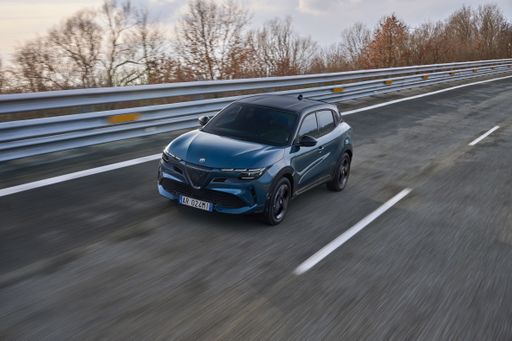 @ Alfa Romeo / Stellantis Media
@ Alfa Romeo / Stellantis Media
Alfa Romeo Junior
Alfa Romeo Junior
The Alfa Romeo Junior captures the essence of Italian design with its sleek lines and compact dimensions, making it an icon of elegance and performance. With a spirited driving experience and a charming retro aesthetic, it appeals to enthusiasts and casual drivers alike. This delightful car embodies the brand's rich heritage while remaining a fun and engaging option for those seeking a unique automotive experience.
details @ Alfa Romeo / Stellantis Media
@ Alfa Romeo / Stellantis Media
 @ Alfa Romeo / Stellantis Media
@ Alfa Romeo / Stellantis Media
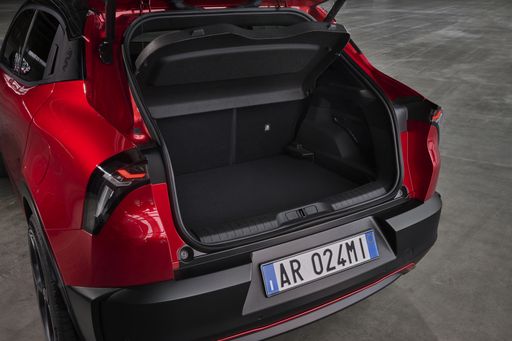 @ Alfa Romeo / Stellantis Media
@ Alfa Romeo / Stellantis Media
SsangYong Korando
The SsangYong Korando offers a blend of contemporary design and practicality, making it an appealing choice for urban adventurers. Its spacious interior and comfortable seating ensure a pleasant driving experience for both driver and passengers. With its reliable performance and advanced features, the Korando stands out in the competitive SUV market.
details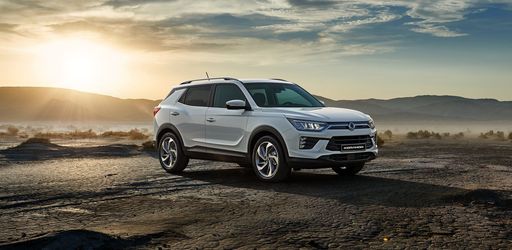 @ SsangYong Motor / KG Mobility
@ SsangYong Motor / KG Mobility
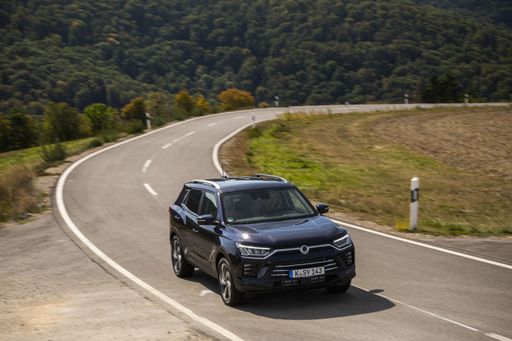 @ SsangYong Motor / KG Mobility
@ SsangYong Motor / KG Mobility
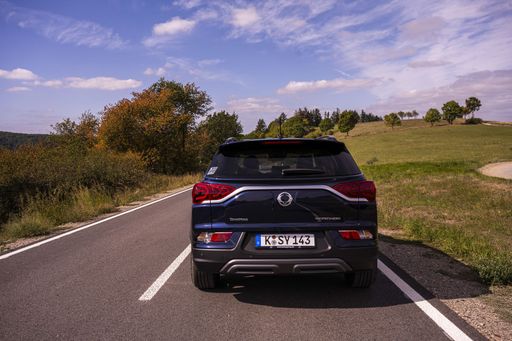 @ SsangYong Motor / KG Mobility
@ SsangYong Motor / KG Mobility
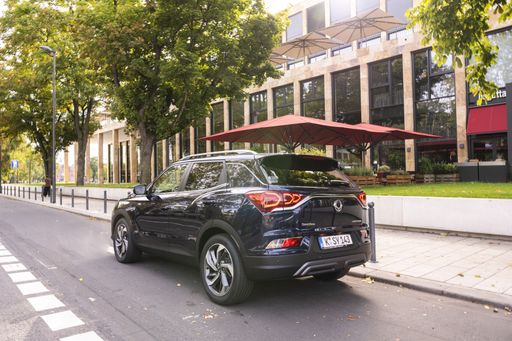 @ SsangYong Motor / KG Mobility
@ SsangYong Motor / KG Mobility
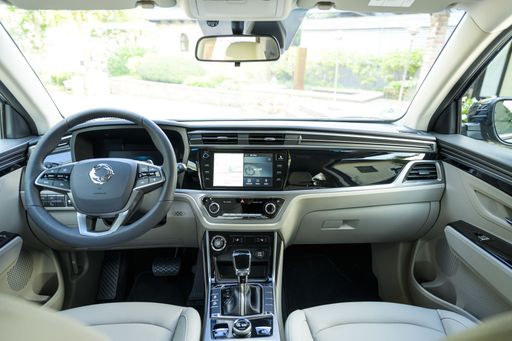 @ SsangYong Motor / KG Mobility
@ SsangYong Motor / KG Mobility
 @ Alfa Romeo / Stellantis Media
@ Alfa Romeo / Stellantis Media
|
 @ SsangYong Motor / KG Mobility
@ SsangYong Motor / KG Mobility
|
|
|
|
Costs and Consumption |
|
|---|---|
|
Price
25700 - 41600 £
|
Price
27000 - 42000 £
|
|
Consumption L/100km
4.8 - 5.4 L
|
Consumption L/100km
7.5 - 8.6 L
|
|
Consumption kWh/100km
15.1 - 17.5 kWh
|
Consumption kWh/100km
16.80 kWh
|
|
Electric Range
344 - 410 km
|
Electric Range
339 km
|
|
Battery Capacity
0.4 - 51 kWh
|
Battery Capacity
-
|
|
co2
0 - 119 g/km
|
co2
0 - 197 g/km
|
|
Fuel tank capacity
44 - 45 L
|
Fuel tank capacity
50 L
|
Dimensions and Body |
|
|---|---|
|
Body Type
SUV
|
Body Type
SUV
|
|
Seats
5
|
Seats
5
|
|
Doors
5
|
Doors
5
|
|
Curb weight
1380 - 1689 kg
|
Curb weight
1517 - 1840 kg
|
|
Trunk capacity
340 - 415 L
|
Trunk capacity
551 L
|
|
Length
4173 mm
|
Length
4450 - 4465 mm
|
|
Width
1781 mm
|
Width
1870 mm
|
|
Height
1505 - 1538 mm
|
Height
1620 - 1645 mm
|
|
Max trunk capacity
1205 - 1280 L
|
Max trunk capacity
1248 L
|
|
Payload
390 - 420 kg
|
Payload
410 - 463 kg
|
Engine and Performance |
|
|---|---|
|
Engine Type
Electric, Petrol MHEV
|
Engine Type
Petrol, Electric
|
|
Transmission
Automatic
|
Transmission
Manuel, Automatic
|
|
Transmission Detail
Dual-Clutch Automatic, Reduction Gearbox
|
Transmission Detail
Manual Gearbox, Automatic Gearbox, Reduction Gearbox
|
|
Drive Type
Front-Wheel Drive, All-Wheel Drive
|
Drive Type
Front-Wheel Drive, All-Wheel Drive
|
|
Power HP
136 - 280 HP
|
Power HP
163 - 190 HP
|
|
Acceleration 0-100km/h
5.9 - 9.1 s
|
Acceleration 0-100km/h
8.40 s
|
|
Max Speed
150 - 206 km/h
|
Max Speed
156 - 191 km/h
|
|
Torque
230 - 345 Nm
|
Torque
260 - 360 Nm
|
|
Number of Cylinders
3
|
Number of Cylinders
4
|
|
Power kW
100 - 207 kW
|
Power kW
120 - 140 kW
|
|
Engine capacity
1199 cm3
|
Engine capacity
1497 cm3
|
General |
|
|---|---|
|
Model Year
2024 - 2025
|
Model Year
2021 - 2023
|
|
CO2 Efficiency Class
A, C, D
|
CO2 Efficiency Class
F, G, A
|
|
Brand
Alfa Romeo
|
Brand
SsangYong
|
What drive types are available for the Alfa Romeo Junior?
Available configurations include Front-Wheel Drive or All-Wheel Drive.
The prices and data displayed are estimates based on German list prices and may vary by country. This information is not legally binding.
